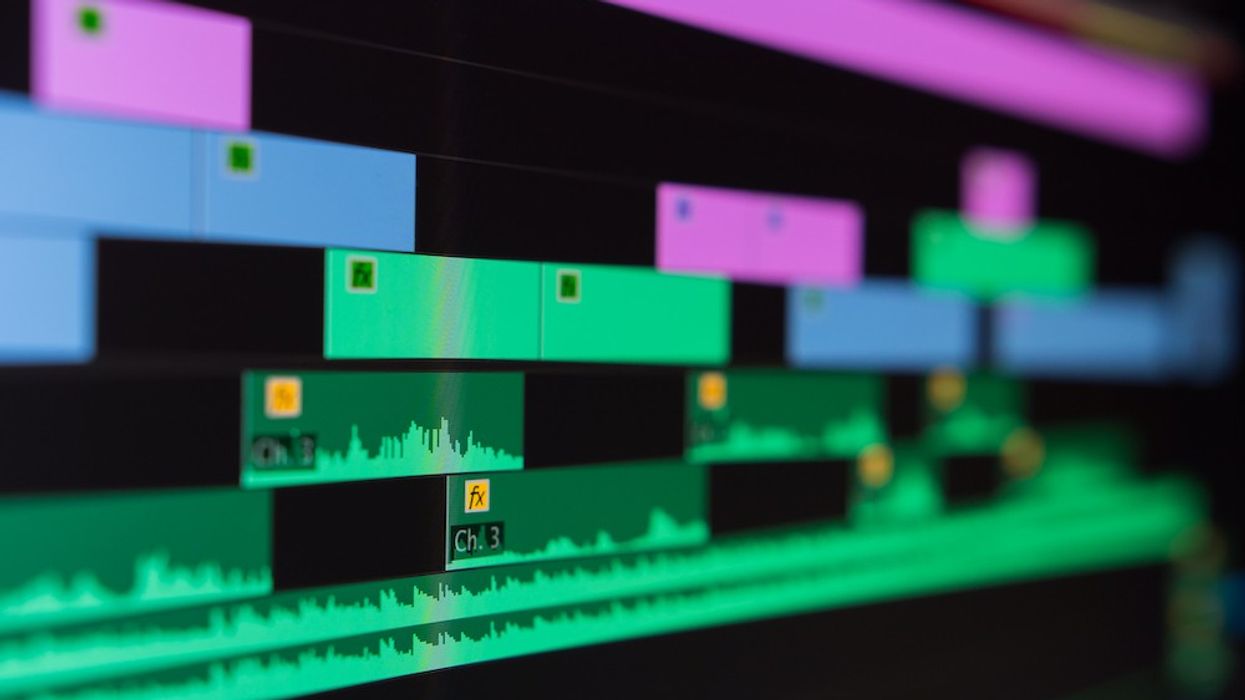Learn How to Edit with These Free Resources
Editors are often the unsung heroes of storytelling. Learn the basics and beyond with these helpful lessons.

Editing is an art form learned over time, and even those considered to be the best in the business openly admit that they are still improving their craft with every new project. If you want to learn how to edit, there is an abundance of resources available. But where do you start?
Some might say to rip the band-aid off and dive into a timeline immediately. Others will suggest rising through the ranks as an assistant editor. Signing up for classes is also an option. So is reading books about the craft. Walter Murch's In the Blink of An Eye is a must for every editor and filmmaker. Reading and watching interviews is another great way to learn from those who have done it before, like this one with editor Lee Smith or this video series where top editors share essential advice. The point is, everyone learns and comes up through the ranks differently.
The most important thing to understand about editing is that you are there to serve the story. It's not about you. If the story doesn't work, you're going to lose the audience. Now, it's possible the story doesn't work no matter how much you rearrange or edit the provided footage. The issues could stem at the script level or at the production level. Maybe the footage isn't piecing together that way it could and reshoots are necessary.
Many productions try to avoid this by bringing in the editor early on to collaborate during prep. Some productions even go as far as having the editor on set cutting the footage the same day. Editor Maryann Brandon did so for J.J. Abrams's Star Wars: The Rise of Skywalker. The same can be said for editor Colby Parker Jr. on many of Peter Berg's films, like Deepwater Horizon and Lone Survivor.
While we are on the subject, for the producers and directors reading this article, we can't stress it enough—the earlier you can bring on an editor, or for that matter, any of the key department heads like production design, production sound, post sound, or wardrobe into the process, the better off your project will be. No Film School has interviewed hundreds of filmmakers and having more time with a project is one of the most recurring requests.
The tools used by editors to shape stories are just that—tools. Learning how to use Adobe Premiere Pro, Avid Media Composer,Blackmagic DaVinci Resolve, Apple's Final Cut Pro, Vegas, or any in between is a matter of simply reading a manual, whether it's in printed or video form.
While it's important to understand what the software is capable of and how to do it, it's only a small element to good storytelling. The conversations about which software is better over another is white noise. The demands of each project are going to be different and the tools you will need to tell that story will change. So, is it important to know at least the basics of each program? Yes. But that's only the start.
Dive into the links below to learn more about improving your skills as an editor.
Books
- The 20 Best Books on Filmmaking for 2020
- In the Blink of An Eye by Walter Murch
- The Filmmaker's Eye by Gustavo Mercado
- The Art Of The Cut: Editing Concepts Every Filmmaker Should Know by Greg Keast
- The Filmmaker's Eye by Gustavo Mercado
- Master Shots by Christopher Kenworthy
Interviews
- 10 Lessons from Today's Top Film Editors
- 5 Things We All Wished We Knew About Editing When We First Started
- 7 Editors Take Us Behind the Curtain on Cutting a Sundance Feature
- 4 Tips Every Editor Should Know From 'Black Mirror' Editor Selina MacArthur
- Editing with a Sensor of Humor
- 4 Steps to Growing Your Editing Career
- 3 Quick Tricks That Will Make You a More Efficient Editor
- How to Get Hired As A "Go-To" Editor
- 'Parasite' Editor Jinmo Yang Teaches Us How to Edit Without Coverage
- What an Editor Does to Get a Film Into Sundance
- What Does Nolan's Editor Think is His Biggest Challenge?
- 'Portlandia' Editor Reveals How to Make Sketch Comedy Funny
- How the 'Avengers: Endgame' Editor Created the Best Ending in the MCU
- Lisa Zeno Churgin on the Keys to a Successful Director/Editor Relationship
Avid Tutorials
- Learn the Basics of Editing Straight from Software Makers
- Edit Faster with These Avid Media Composer Shortcuts
Adobe Premiere Tutorials
- Learn How to Use Premiere Pro in 15 Minutes
- Learn Straight from Software Makers
- Learn Five Editing Basics in Premiere Pro
- Learn Premiere Pro with this Free 10 Part Course
- 69 Free Tutorial Videos to Help You Learn Premiere Pro
- Learn How to Color Correct in Premiere Pro for Free
- Practical Ways You Can Be a Faster Editor by Using Keyboard Shortcuts
- Learn the 3 Stages of Using the Pancake Timeline inPremiere Pro
- Learn How to Make Your Footage Look More Cinematic in Premiere Pro
- Essential Tips That Will Help You Master Speed Ramping in Premiere Pro
DaVinci Resolve Tutorials
- Introduction to Editing in DaVinci Resolve
- Blackmagic's Free, 444-Page Guide to DaVinci Resolve 16
- Overview Demo of New Features in DaVinci Resolve 16
Final Cut Tutorials
- Learn Directly from Apple
- 6 Effects Final Cut Pro X Users Can Use in Their Daily Workflow
- How to Generate Storyboards in Final Cut Pro X
- How to Import Third Party LUTs in Final Cut Pro X
Vegas Tutorials
- Official Online Tutorials Straight from the Makers
- Basic to Advanced Tutorials from Artists and Creators
Do you have a favorite resource where you learn how to advance your skills as an editor? Let us know in the comments below.












